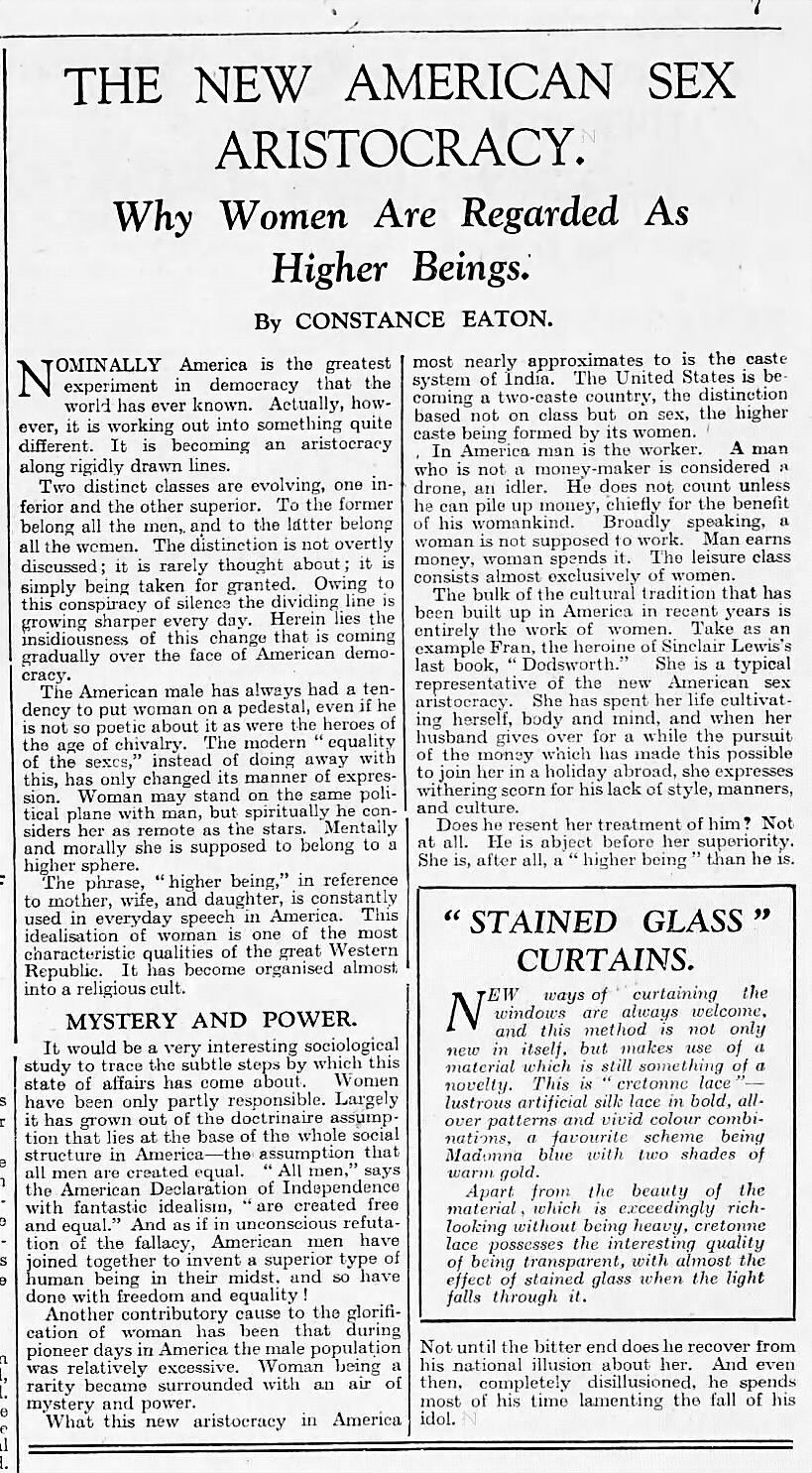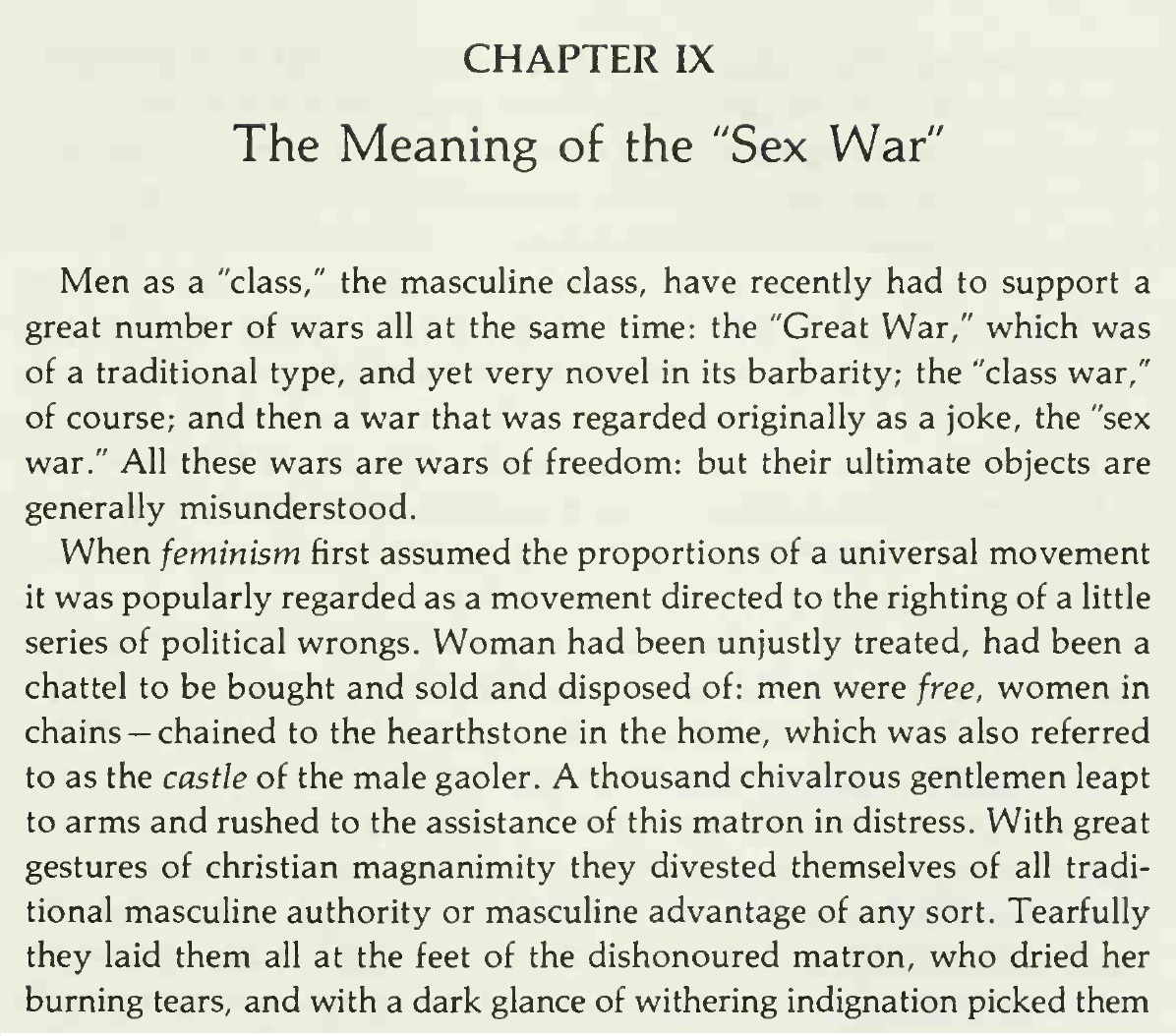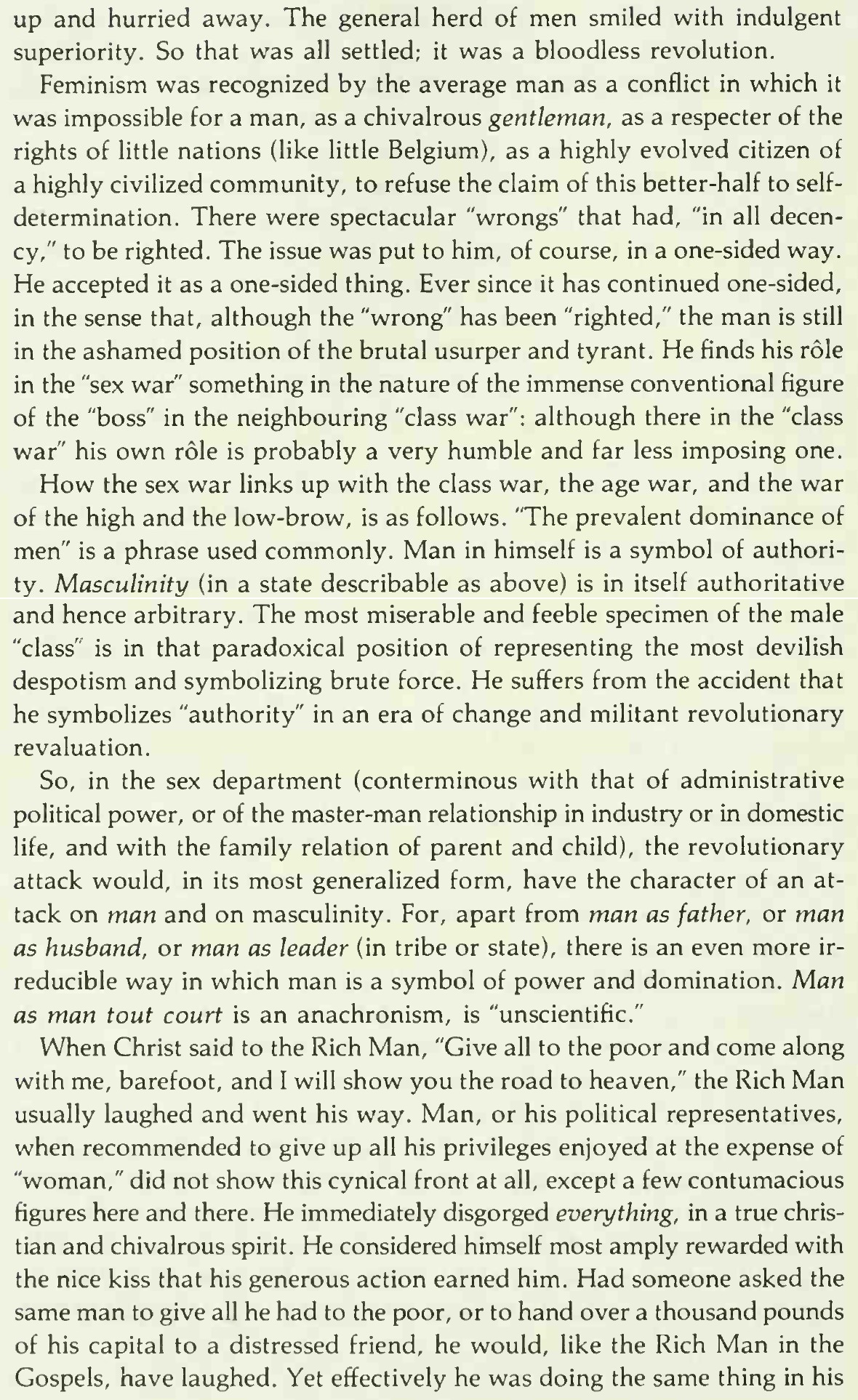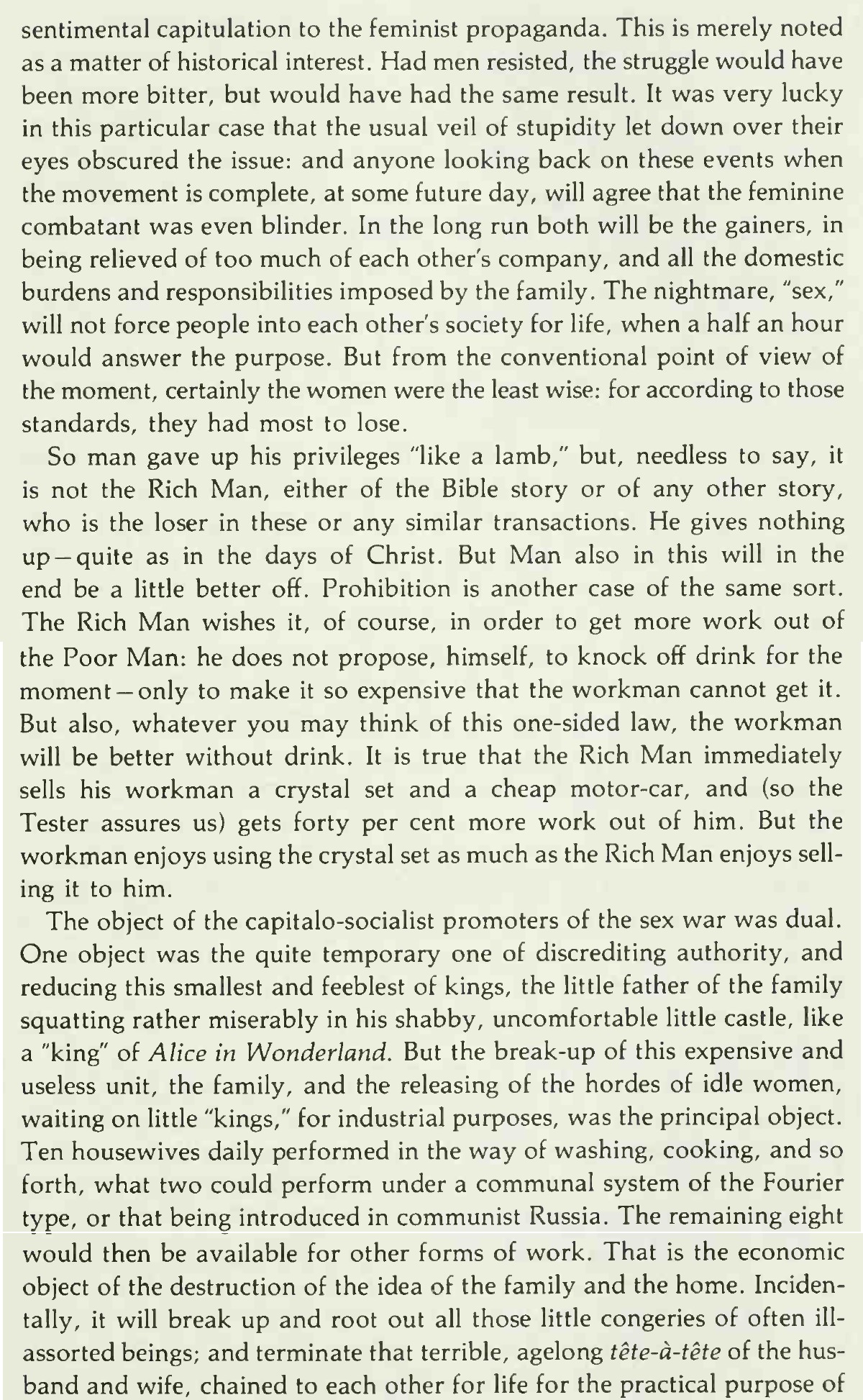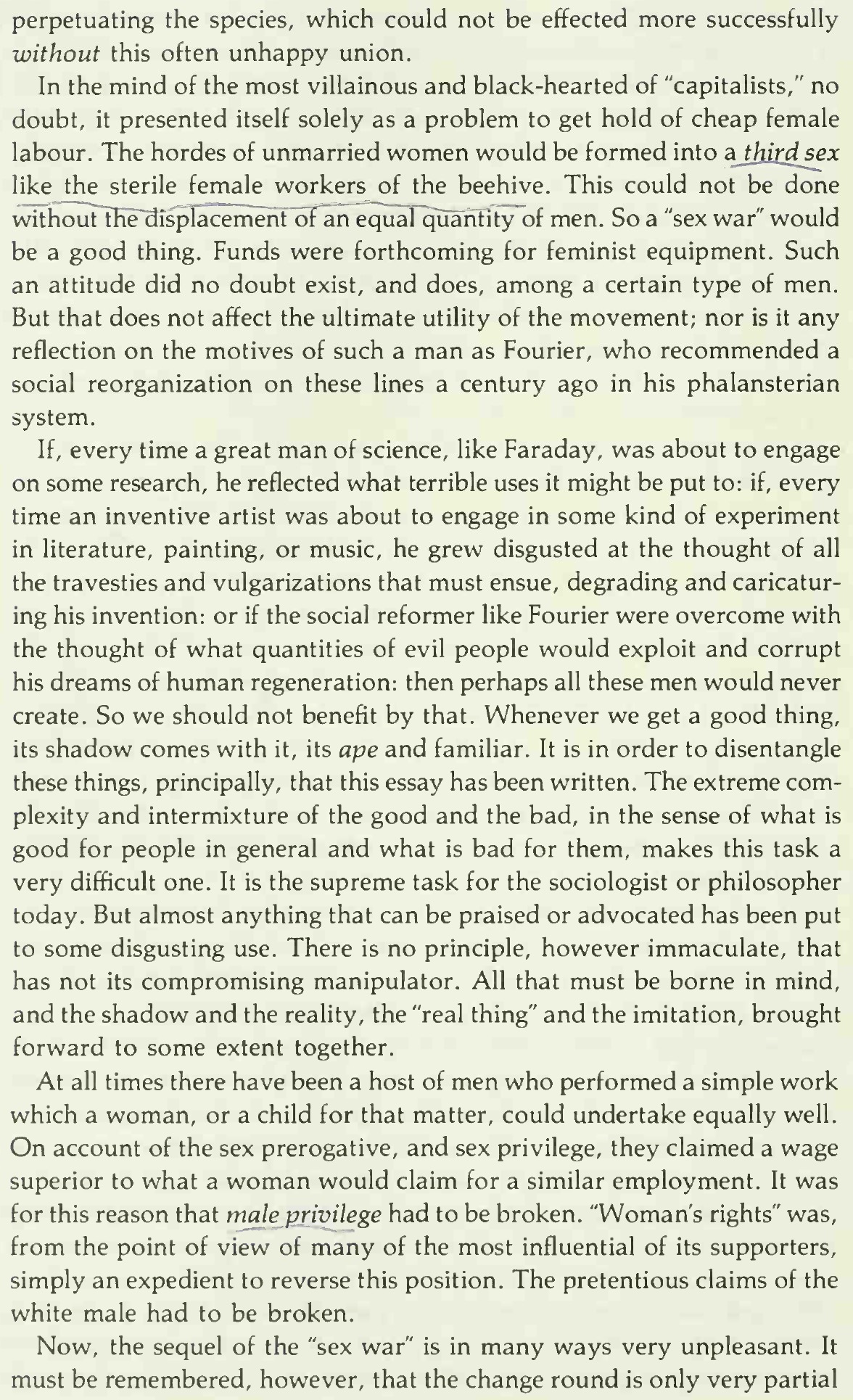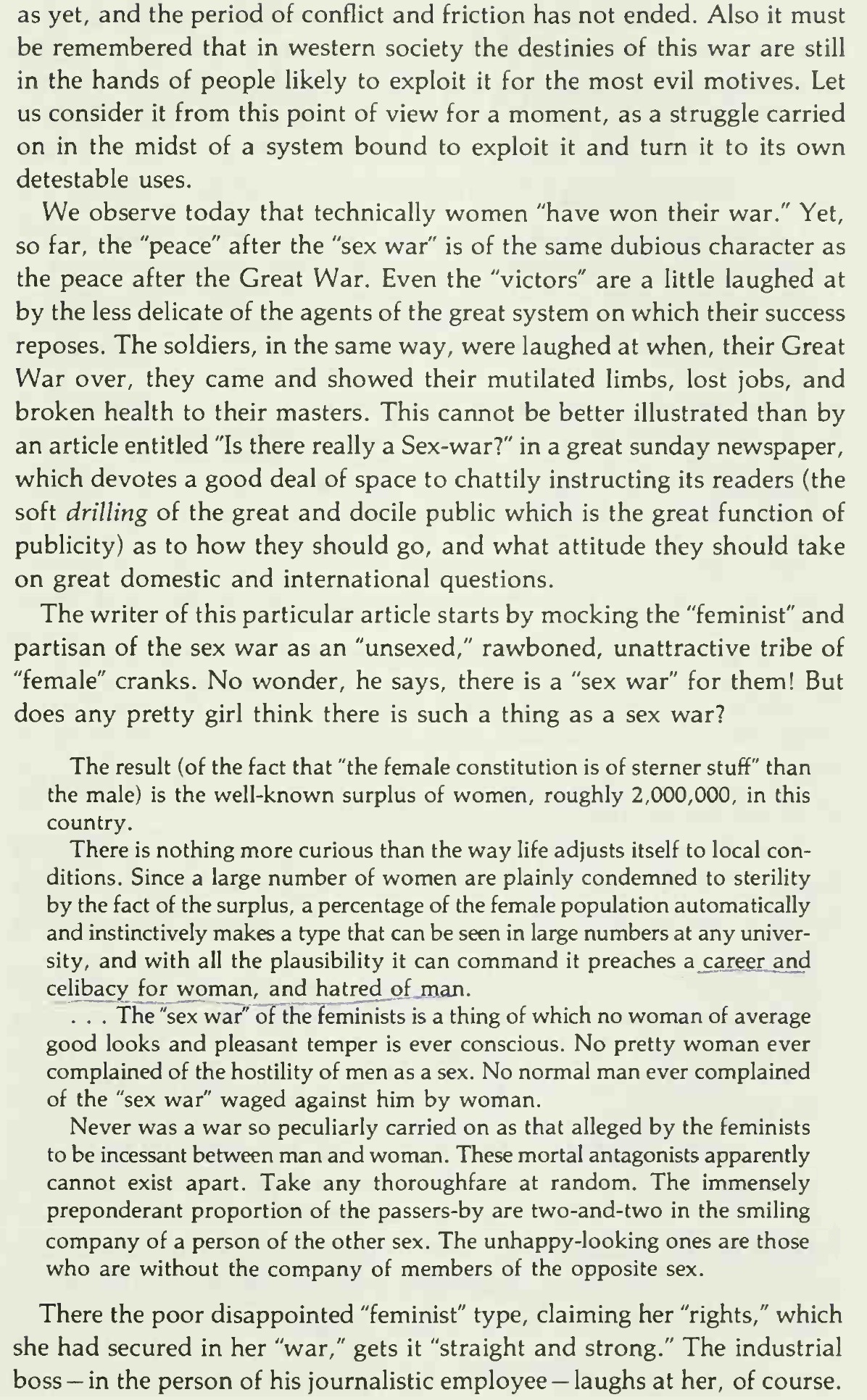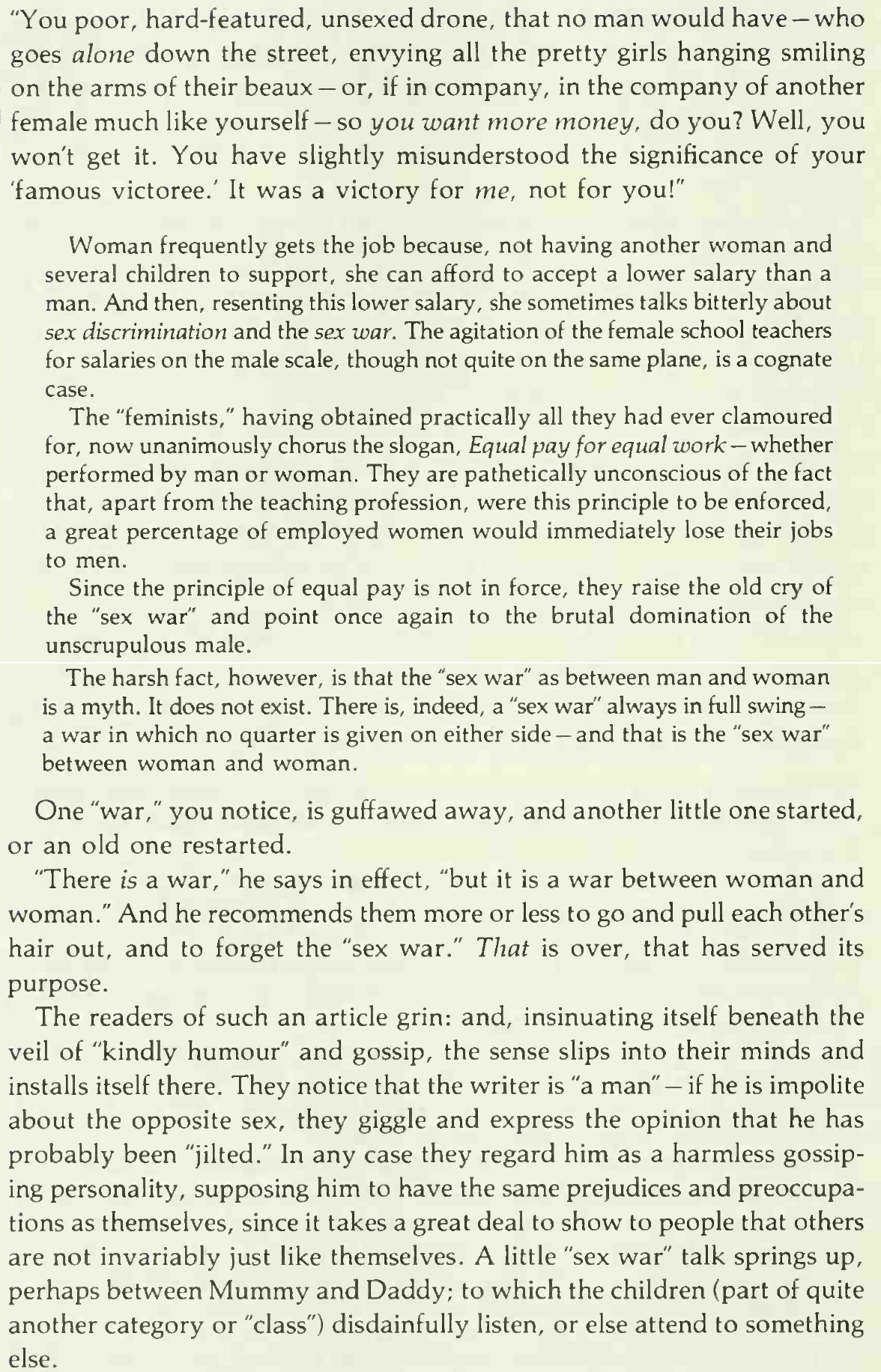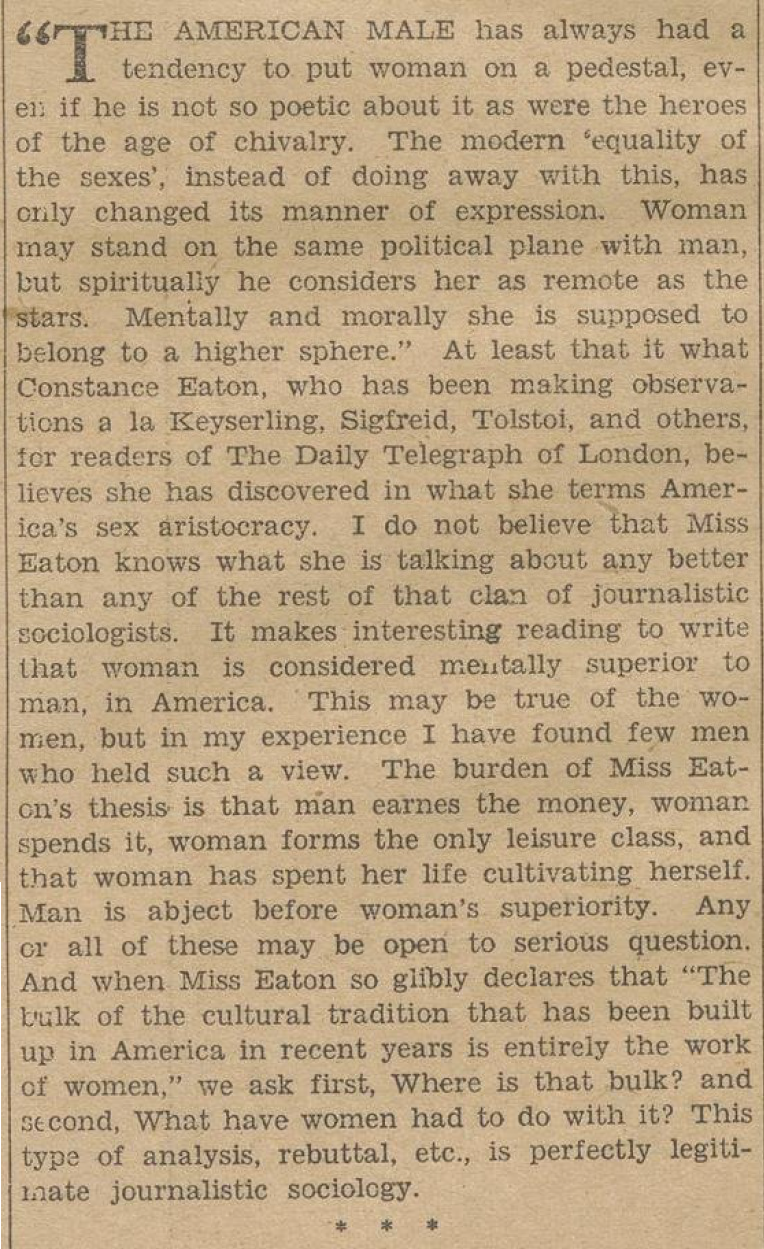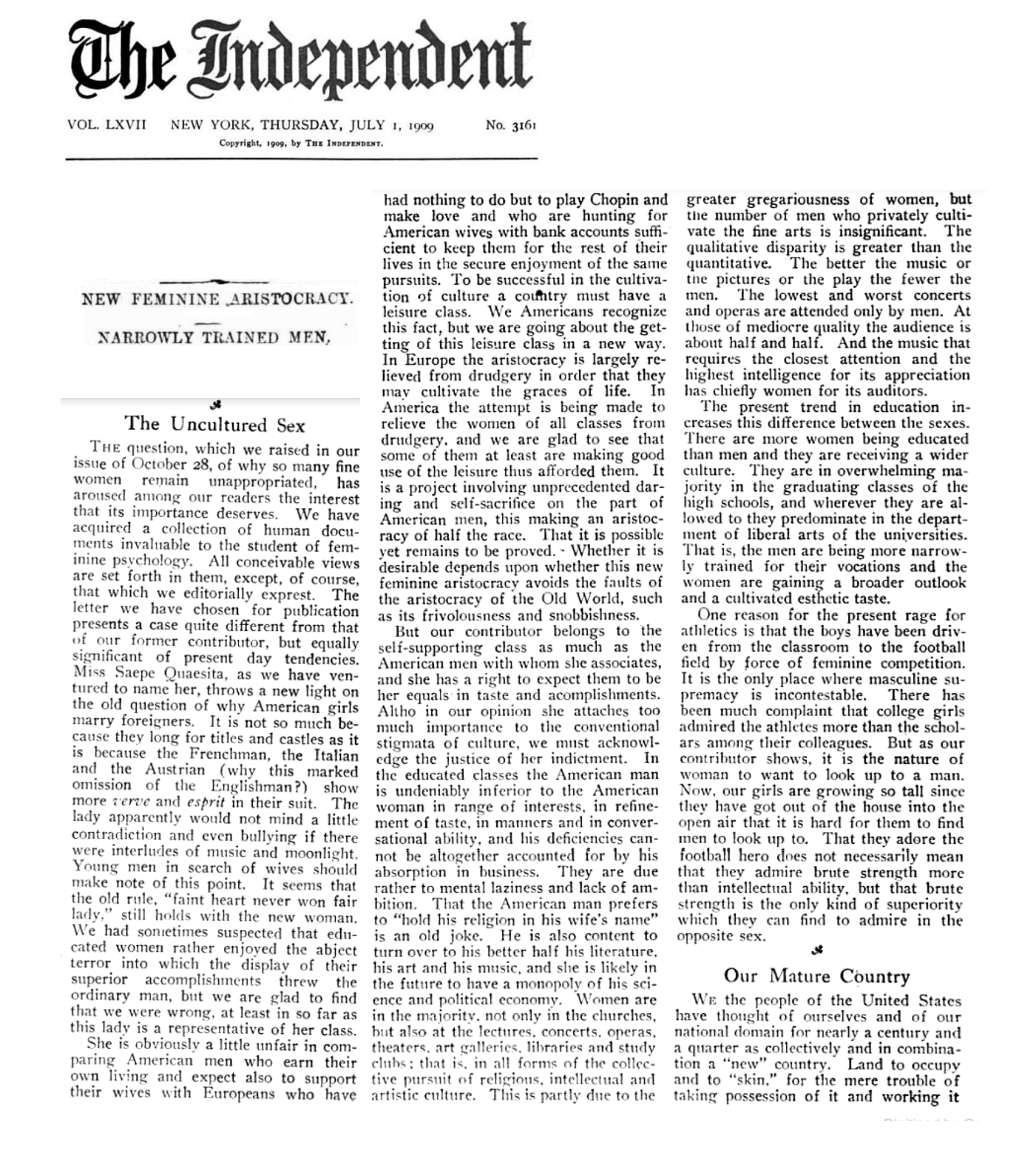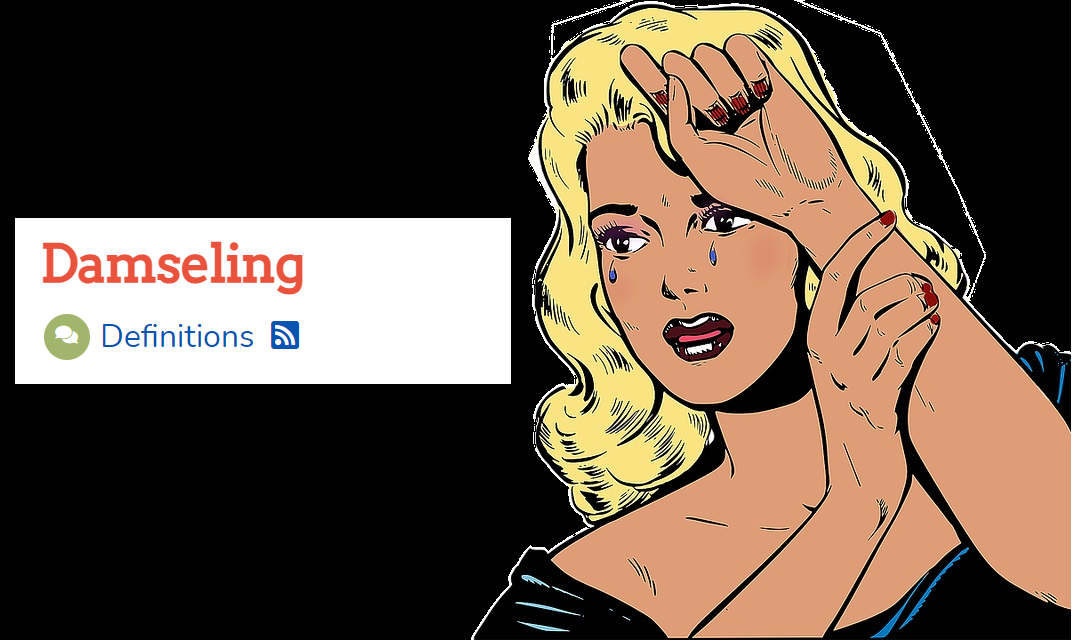The following essay on the status of American women was published in the year 1903 by culture critic Max O’Rell. – PW
THE AMERICAN WOMAN—I
A new coat-of-arms for America—The American woman—Her ways—The liberty she enjoys—’Oh, please make me an American woman!’
If I were asked to suggest a new coat-of-arms for the United States of America, I would propose a beautiful, bright, intelligent-looking woman, under the protection of an eagle spreading its wings over her, with the motto: Place aux Dames—’Honour to the Ladies’; or, if you prefer a freer translation, ‘Make room for the Women.’
The Government of the American people is not a republic, it is not a monarchy: it is a gynarchy, a government by the women for the women, a sort of occult power behind the scenes that rules the country.
It has often been said that a wife is what a husband makes her. I believe that the women of a nation are what the men of that nation make them. Therefore, honour to the men of the United States for having produced that modern national ideal — the American woman.
I have been six times all over the United States. I have spent about three years of my life in America, travelling from New York to San Francisco, from British Columbia to Louisiana. If there is an impression that becomes a deeper and deeper conviction every time that I return to that country, it is that the most interesting woman in the world is the American woman.
Now, let us compare her with the women of Europe. The English woman, when beautiful, is an ideal symphony, an incomparable statue, but too often a statue. The French woman is the embodiment of suppleness and gracefulness, more fascinating by her manner than by either her face or figure.
The Roman woman, with her gorgeous development, suggests the descendant of the proud mother of the Gracchi. The American woman is a combination, an ensemble.
I have never seen in America an absolutely, helplessly plain woman. She is always in the possession of a redeeming ‘something’ which saves her. She may be ever so homely (as the Americans say), she looks intelligent, a creature that has been allowed to think for herself, that has never been sat upon. And I know no sight more pleasing than an elderly American woman, with her white hair, that makes her look like a Louis XV. marquise, and an expression which reflects the respect she has inspired during a well and usefully spent life.
When women were born, a fairy attended the birth of every one of them. Each woman received a special gift. The American woman arriving late, the fairies gathered together and decided to make her a present of part of all the attributes conferred on all the other women. The result is that she has the smartness and the bright look of a French woman, and the shapely, sculptural lines of an English woman. Ah! but, added to that, she has a characteristic trait peculiarly her own, an utter absence of affectation, a naturalness of bearing which makes her unique, a national type. There is not in the world a woman to match her in a drawing-room. There she stands, among the women of all nationalities, a silhouette bien découpée, herself, a queen.
Allowed from the tenderest age almost every liberty, accustomed to take the others, she is free, easy, perfectly natural, with the consciousness of her influence, her power; able by her intelligence and education to enjoy all the intellectual pleasures of life, and by her keen powers of observation and her native adaptability to fit herself for all the conditions of life; an exquisite mixture of a coquette without affectation and a blue-stocking without spectacles or priggishness; the only woman, however beautiful and learned she may be, with whom man feels perfectly at his ease—a sort of fascinating good fellow, retaining all the best attributes of womanhood.
Now, if this should sound like an outburst of enthusiasm, please excuse me. I owe to American women such pleasant, never-to-be-forgotten hours that on merely hearing the mention of the American woman I take off my hat.
Of all the women in the world, the American woman is the one who receives the best attentions at the hands of men. The Frenchman, it is true, is the slave of his womankind, but he expects her to be his thorough partner—I mean, to share with him his labours as well as his pleasures. The American man is the most devoted and hard-working husband in the world. The poor, dear fellow! He works, and he works, and he works, and the beads of perspiration from his brow crystallize in the shape of diamonds all over the ears, the fingers and the neck of his interesting womankind.
He invites her to share his pleasures, but he saves her the trouble of sharing his anxieties. The burden of life from seven in the morning till seven in the evening rests on his shoulders alone.
Yet, in spite of all this, I have seldom discovered in American women the slightest trace of gratitude to men. The American woman expects a triumphal arch to be erected over each doorway through which she has to pass—and she gets it.
Well, she deserves it.
Almost throughout the length and breadth of the United States, you hear of women seeking to extend the sphere of their influence, women dissatisfied with their lot. But there is no satisfying spoiled children. If they see the moon reflected in a pail of water, they must have it.
I am perfectly convinced that the American woman has secured for herself the best, the softest berth that it was possible to secure in this world.
Let me finish by repeating an exclamation I uttered after my first visit to the United States, twelve years ago: ‘If I could choose my sex and my birthplace, I would shout to the Almighty at the top of my voice: “Oh, please make me an American woman!”‘
THE AMERICAN WOMAN—II
She walks first, Jonathan behind her—The educational system of America explains the idiosyncrasies of the American woman.
The first time that I was in America, some twelve years ago, I one day mentioned to a newspaper reporter that I could not find a cup of tea to please me anywhere in America. The next day a paragraph about me appeared in the paper, headed, ‘Max is going to abuse everything in America.’
A few days later I had an opportunity to mention to another reporter that, however bad meals were in some hotels in the small cities, I could everywhere get a cup of coffee quite as good as in France, if not even better. The next day a paragraph appeared headed: ‘Max wants our dollars.’
I have many times lectured in the United States on women, including a sketch on American women. After the lecture I have generally been introduced to some ladies of the audience, who kindly expressed the desire of shaking hands with me.
Almost every time one or two have taken me aside, and said: ‘I have read in your books and your magazine articles and heard in your lectures all you have to say about American women; but now, tell me, what do you really think of them?’
My dear ladies, there are some men who do occasionally speak the truth, or what they believe to be the truth, and who do say what they mean, and mean what they say.
The English, long ago, warned me that I would not be able to do in America what I had successfully done in England, because the Americans, they said to me, were much more susceptible and sensitive than the English. They were mistaken.
No doubt the Americans had resented, and justly, too, the criticisms of Trollope and Dickens (the latter had to write a permanent apology in the preface of ‘Martin Chuzzlewit’). Criticism that never offends, and praises that never flatter, are, I believe, everywhere acceptable when they are taken in the spirit of fairness and good-humour in which they are expressed. I believe, and firmly believe, the American women to be the most interesting and the most brilliant women in the world, and I do not see why I could not proclaim it from the house-tops if I like, even in America.
They are picturesque, vivacious, natural, stylish, smart, clever, unconventional, and the best educated. They are typical, perfectly labelled.
Take me to a drawing-room in Paris or in London, and, without being introduced to anyone, I think I should be able to pick out all the American women in the room.
Once, after a lecture in England, I received the card of a young American lady who wished to speak to me. She came and brought in her mother, and also a man, who all the time stood in the rear. When we parted, she left, followed by her mother. Then I discovered the man, who said to me most meekly, ‘I’m the father.’ Poor dear man! he looked so small as he emerged from the background!
I cannot help thinking that there exists in some American women a little mild contempt for that poor creature that is called a man.
And how is that in a country where the women receive such delightful, and, for that matter, well-deserved attentions at the hands of the men, and that throughout the length and breadth of the country?
Well, I think the educational system of America explains the phenomenon.
In Europe the sexes are kept apart in youth—I mean at school, and, in France especially, young boys and young girls entertain for one another very strange feelings, most of them founded on ignorance.
In Europe even now the education received by girls cannot be compared to the education received by boys. That’s being changed now—some say improved. H’m! we shall see.
It was not a long time ago that, in England and in France, when a girl could read, write, add, and subtract, name the capitals of Europe, and play ‘The Maiden’s Prayer’ on the piano, her education was finished; she was prepared for the world and ready for her husband—and her neighbours.
Very often I have been invited to be present at the distribution of prizes in large English public schools and colleges. When I was in a girls’ school, I never once failed to hear those poor girls told, and by men, too, that practically the only thing they should think about was to prepare to become one day good wives and good mothers.
I have been many times present at the distribution of prizes in boys’ schools in England, and I know that I never heard those boys told that now and then they might think of preparing to become one day decent fathers and tolerable husbands.
In America things are different. In every grade of educational life, among the masses of the people, boys and girls are educated together, side by side; on each bench a boy, a girl, a boy, a girl.
Now, the official statistics of the Education Department declare that in every State of the Union the number of diplomas and certificates obtained by girls is larger than the number obtained by boys.
When I heard that statement, I said this to myself (kindly follow my little argument): ‘Is it not just possible that the young American boys, when they saw what those girls next to them could do, said to themselves, “Heaven! who would have thought so?”‘
Is it not also possible that the young American girls, when they saw what those boys next to them could do, exclaimed, ‘Good gracious! is that all?’
Does not that, to a certain extent, explain to you the respect that young boys acquire at school for young girls, and perhaps, also, that little mild absence of respect that girls get for boys? I believe there is something in it.
Ah, my dear European men, who clamour at the top of your voices for the higher education of women, be careful! You will be found out, and, like your fellow-men of America, by-and-by you will have to take the back-seat.
THE AMERICAN WOMAN—III
Opinions and impressions — An answer to criticism.
Whenever I read a testimonial given to a candidate for some vacant post, I invariably take it for granted that the candidate does not possess the virtues, attainments, or qualities which are not mentioned in that testimonial.
This must have evidently been what that clever American writer, Mrs. Winifred Black, thought when she read an article of mine on American women which appeared in the Editorial section of the New York Sunday Journal some time ago. My admiration for American women is, I think, pretty well known to the public, but more particularly to my most intimate friends. In that article I said: ‘I firmly believe the American women to be the most fascinating, the most interesting, and the most brilliant women in the world; and I do not see why I could not proclaim it from the housetops, if I like, even in America.’ And after mentioning the respect which woman inspires in American men of all classes, the liberty she enjoys, the attentions that are lavished upon her, I concluded the article by exclaiming: ‘If I could choose again my sex and my birthplace, I would shout to the Almighty at the top of my voice: “Oh, please make me an American woman!”‘
‘Now,’ exclaims Mrs. Winifred Black, ‘look between the words of that cleverly constructed sentence, and he who runs may read that Max O’Rell means to say in the still small voice of his innermost convictions: “Make me anything on earth except an American man!”‘
‘And,’ she goes on, ‘our friend is covering himself with well-earned glory, telling us all about the American woman. “She is beautiful, clever, adored, a queen”; but he does not mention that she is good, honest, true, unselfish, loving. Not a syllable about her heart and her soul. Do you know why? Because Max O’Rell thinks that the American woman has neither heart nor soul.’
Oh, oh! my dear lady, how quickly you set to work and jump at conclusions!
Mrs. Winifred Black evidently believes that when I propose the toast, ‘The American ladies—God bless them!’ I whisper under my breath all the time: ‘The gentlemen—God help them!’
Now, madam, let me tell you that this is witty, smart, but not fair criticism. If I ever should have the honour of being introduced to you, I would say to you: ‘When a foreigner attempts to describe the character of the people he visits, he either receives impressions, if he keeps his eyes fairly well open, or he forms opinions, if he resides in that country for a long time or happens to be a born conceited idiot. Impressions are not opinions. Impressions mean nothing more than this: how a nation strikes a foreigner who pays a short visit to it. You see a town for a day, you meet a person for ten minutes. That town, that person, has left an impression on you, but you hold no opinion on either.
I know a charming little book on Denmark, honestly entitled by its author, ‘A Week in Denmark.’ Now, surely you would not expect to find in such a book a study of the institutions of Denmark or opinions on the idiosyncrasies of the Danish people. You would not expect the writer to tell you whether the Danish women have or have not a heart and a soul. No, you would expect to find an impression such as the following, which I find in that delightful, chatty, and unpretentious little volume: ‘The Danish women wear the national colours of France—blue eyes, white complexion, and red lips.’ I have been six times in the United States. I have seen the whole continent from New York to San Francisco, from British Columbia to Louisiana, but all the time I have been on the move, seldom spending two days in the same town. How could I form opinions worth repeating?
The qualities which, for instance, I may have discovered in American women are superficial ones—I mean outward ones, those that would be noticed by the casual visitor—brilliancy, conversational power, beautiful figures, attractive, intelligent faces, smartness in dress, gait, and carriage. To get at their hearts and their souls, I should have to settle in the country, and for years and years live among the people.
THE HUSBAND OF THE AMERICAN WOMAN
The telephone and the ticker—The most useful of domestic animals—Money-making—Loneliness of the women—A reminiscence of Chicago.
On the whole, I believe that there is no country where men and women go through life together on such equal terms as in France. The wife follows her husband everywhere; she is the companion of his pleasures as well as of his hardships. She works with him, takes her vacation with him, and when they have amassed a little fortune that insures independence, they knock off work together and enjoy life quietly for the rest of their days. In business, the wife is the clerk of her husband, often his cashier, always his partner. She is consulted by him in the investment of their savings. It is a little firm—Monsieur, Madame and Co.
In England, the wife does not share the hardships of her husband, and not always his pleasures. She is seldom consulted in important matters.
What often astonishes us in Europe is to see a crowd of handsome and clever women, whom America sends to brighten up society, and who reappear in London and Paris every year with the regularity of the swallows. The London season, from the beginning of May to July 25, the Paris season, from the beginning of April to June 10, are absolutely run by them. You meet them everywhere, at dinner-parties, ‘At Homes,’ and the play. You conclude that they must be married, because they are styled Mrs. and not Miss, but whether they are wives, widows, or divorcées, you rarely think of inquiring, and you go on enjoying their society, even their friendship, year after year, without knowing whether there exists, somewhere in America, a Mr. So-and-so or not.
It was in America only, on calling on my lady friends whose acquaintance I had made in Europe, that I discovered the existence of their husbands. I found them very much alive, having for the companions of their joys and sorrows the telephone and the ticker.
Now, an impression (not an opinion, much less a conviction) to be formed from all this is that the American woman, with all her physical beauty and intellectual attainments, is not always a woman whose characteristic traits are devotion, unselfishness, and self-sacrifice. But it is not her fault if this should be the case, and I have no reason to suppose that it is. In a community, woman is what man makes her. So long as men’s first consideration is business and money-making, so long as they consider clubs the proper place to seek relief in from the pursuits and hardships of everyday life, so long as wives are practically left to themselves to make the best of the long leisures of the day, the women will study how best they can arrange for themselves a life of comfort, ease and pleasure.
Is there any other country where you will find women able to enjoy life without the companionship of men? They have come to an understanding among themselves. They will have lunch, dinner-parties, where no male guest will be seen, and they will have a grand time. They try to please each other, and an American woman will use as much coquetry to win a woman as a French woman will use to win a man. Is there any other country where you see so many women’s clubs?
Women’s clubs? The idea!
Yet that American woman has male friends. She is a delightful chum and good fellow, the only woman in the world who can have such male friends, ‘pals’ without the least misconstruction, the least objectionable whisperings on the subject. She calls those male friends by their Christian names in speaking of them, although she invariably mentions her husband as Mr. John B. Smith.
The American men are the most devoted of husbands, but they are not under the influence of their women. They indulge them in all their whims and luxuries, but their status in life is to be their women’s husbands—I will not say upper servants, but domestic animals, not pets, of undeniable usefulness, who work at the sweat of their brows to keep in luxury the most lovely, interesting and expensive womankind in the world.
Some years ago, I was spending a Sunday afternoon in the house of a young married man in Chicago who, I was told, possessed twenty millions. The poor fellow! It was the twenty millions which possessed him. He had a most beautiful and interesting wife, and the loveliest little girl of three or four years of age that I ever set my eyes on. That lovely little girl was kind enough to take to me at once—there’s no accounting for taste! We had a little flirtation in the distance at first. By-and-by, she came toward me, nearer and nearer, then she stopped in front of me, and looked at me, hesitating, with her finger in her pretty little mouth. I knew what she wanted, and I said to her: ‘That’s all right; come on.’ She jumped on my knees, settled herself comfortably and asked me to tell her stories. I started at once. Now, you understand, I was not allowed to stop; but I took breath, and I said to her:
‘Does not your papa tell you long stories on Sundays?’
That lovely little round face grew sad and quite long.
‘Oh no,’ she said; ‘papa is too tired on Sundays.’
A few weeks after I left Chicago that man was taken ill with a disease not uncommon in America, a disease that starts at the top of your head and takes two or three years to kill you in a lunatic asylum, among drivelling idiots and imbeciles.
A couple of years later, being in Chicago again, I made inquiries and learned that the poor fellow was expected to exist a few weeks, perhaps a few months longer.
What a pity, I thought, that beautiful woman had not enough influence over that good man to stop him!
Do not offer me twenty millions at that price. No twenty millions can cure the disease which afflicted that American.
Put a little girl of three on my knees on Sundays, and I will tell her stories from sunrise and go on till sunset, even if I thus run the risk of being prosecuted by the Lord’s Day Observance Society.
